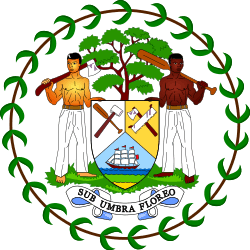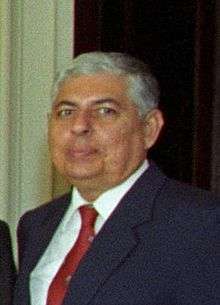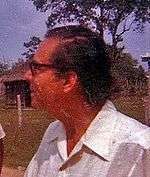Belizean general election, 1993
| | |||||||||||||||||||||||||||||||||||||||||||||||||||||
| |||||||||||||||||||||||||||||||||||||||||||||||||||||
| |||||||||||||||||||||||||||||||||||||||||||||||||||||
| |||||||||||||||||||||||||||||||||||||||||||||||||||||
 |
| This article is part of a series on the politics and government of Belize |
General elections were held in Belize on 30 June 1993.[3] Although the People's United Party received the most votes, the United Democratic Party-National Alliance for Belizean Rights alliance won more seats. Voter turnout was 72.1%.[3]
Background
British forces, kept in Belize by agreement of its government since independence in 1981, were scheduled to leave in 1993 or 1994. There was widespread belief that Belize would fall prey to Guatemalan incursions if the British left.
The PUP won the previous election with a two-seat majority. However, by early 1993 its majority had increased to six thanks to newly elected UDP Area Rep. William Usher of Toledo West crossing the floor to the PUP days after the 1989 election, and a January 1993 by-election win in Freetown after the UDP's Derek Aikman was forced to resign due to bankruptcy.[4][5] Success in the subsequent March municipal elections also gave the PUP added confidence.
Meanwhile, the UDP had been in apparent disarray since 1991, when a group led by longtime Area Rep. Philip Goldson broke with the party to form the National Alliance for Belizean Rights over disagreements on how to handle the longstanding Belizean–Guatemalan territorial dispute. This all compelled Prime Minister George Price to call elections nearly 18 months early (they were not constitutionally due until at least December 1994).
With Price's move the UDP and NABR promptly sought a coalition to achieve victory at the polls. However, Goldson was the NABR's only successful candidate. Although the PUP won a majority of votes nationwide, the UDP/NABR coalition won a slim majority of seats and therefore formed the next government. The election would be Price's last as PUP leader after over 35 years. He was succeeded as party leader in 1996 by Said Musa.
Results
| Party | Votes | % | Seats | +/- |
|---|---|---|---|---|
| People's United Party | 36,082 | 51.2 | 13 | -2 |
| United Democratic Party-National Alliance for Belizean Rights | 34,306 | 48.7 | 16 | +3 |
| Independents | 43 | 0.1 | 0 | 0 |
| Invalid/blank votes | 499 | - | - | - |
| Total | 70,930 | 100 | 29 | +1 |
| Source: Nohlen | ||||
This was an extremely close election in several constituencies:
- Caribbean Shores, in the Belize City area, and Stann Creek West, had margins of only 40 and 34 votes, respectively, with the UDP-NABR winner less than two percent over the PUP runner-up in two-way races. Voter turnout was 67% and 77%, respectively.
- Belize Rural North, with a turnout of 70.6%, chose its PUP winner with 943 votes, to 939 for the UDP-NABR runner-up. There were 23 rejected ballots, more than enough to sway the result if their invalidity was challenged.
- Collet (Belize City area), with a turnout of only 59.8%, chose its UDP-NABR winner with 951 votes, to 950 for the PUP runner-up and 10 votes for an independent candidate. There were three rejected ballots.
- Cayo North, with a turnout of 76.5%, chose its UDP-NABR winner with 1,890 votes, to 1,872 for the PUP runner-up. There were 35 rejected ballots, more than enough to sway the result.
- Corozal Southwest, with a turnout of 80.6%, chose its PUP winner with 1,464 votes, to 1,461 for the UDP-NABR runner-up. There were 13 rejected ballots, more than enough to sway the result.
- Orange Walk North, with a turnout of 85.0%, chose its UDP-NABR winner with 1,426 votes, to 1,421 for the PUP runner-up. There were 12 rejected ballots, more than enough to sway the result.
- Toledo East, with a turnout of 75.2%, chose its UDP-NABR winner with 1,552 votes, to 1,548 for the PUP runner-up. There were 11 rejected ballots, more than enough to sway the result.
References
- ↑ 15 seats won by the UDP, 1 seat won by the NABR (Philip Goldson)
- ↑ Includes votes for NABR candidates
- 1 2 Nohlen, D (2005) Elections in the Americas: A data handbook, Volume I, p104 ISBN 978-0-19-928357-6
- ↑ Ramos, Adele. "Bombshell: Mahmud resigns!", Amandala, 25 November 2014. (accessed 4 December 2014)
- ↑ "Ruling party gets another seat", Kingston Gleaner, 9 September 1989. (accessed 4 December 2014)

